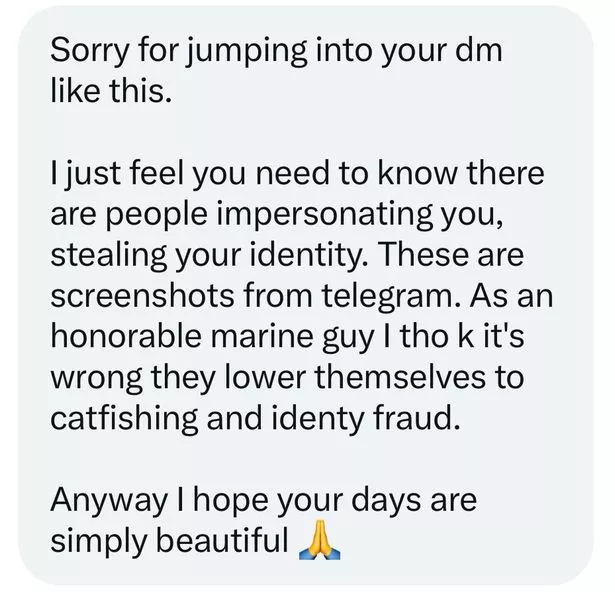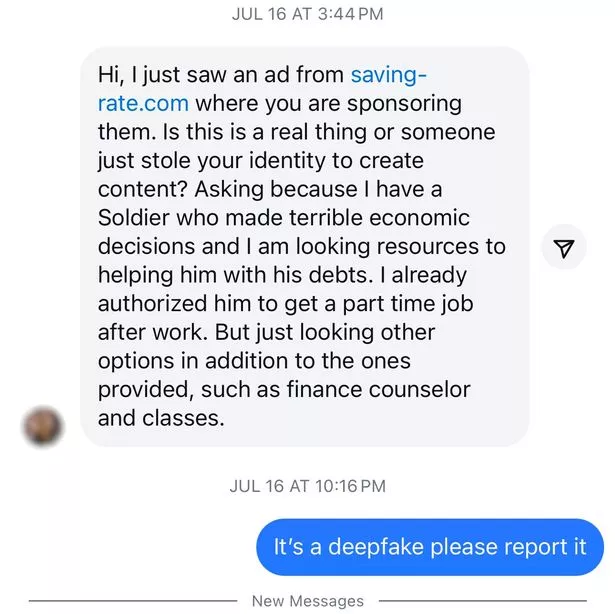US marine Kagan Dunlap says he has been fighting off romance scammers who steal his photos and pretend to be him on dating apps since 2015 – and some have even contacted his wife
A US marine has revealed that women regularly inform his wife he’s cheating on her – due to catfishers impersonating him like in My Sweet Bobby to deceive ‘thousands’ of women.
Influencer and US Marine Corps officer Kagan Dunlap alleges that romance fraudsters have been using his photos and pretending to be him on dating apps since 2015.
The 37-year-old said that at one point, he was receiving dozens of messages daily from unsuspecting victims of the scams, who had been tricked into sending money to these con artists.
Kagan said that some of the women have even contacted his wife of four years, Reilly Dunlap, 36, to tell her they have been in an online romantic relationship with him – which leaves him feeling ‘disgusted’.
The scammers even employ AI technology to imitate his voice from online videos so they can have extended conversations with the victims while pretending to be Kagan. To safeguard himself, Kagan says he has been ‘brutally honest’ with his wife to ensure she understood that these were due to online imposters and not him.
He believes individuals serving in the military are particularly vulnerable to having their identity stolen by online scammers because they can concoct elaborate sob stories about their deployment. He is cautioning people who may have doubts about someone they have been communicating with online to verify they are a real person via video call.
The Netflix documentary My Sweet Bobby delves into the story of radio presenter Kirat Assi who was ensnared in a complex catfishing scheme spanning nine years. Kirat’s online romance began with a Facebook message from a dreamy cardiologist named Bobby, a connection she believed could become a whirlwind love story—it turned out to be nothing but a scam.
Kagan, from Surf City, revealed the staggering extent of the ruse: “I could comfortably say this has affected thousands of women.”
He recounted tales of victims from all corners of the globe: “I’ve had women from all over the planet. All over Europe, Canada, America, Australia, women from everywhere say they’ve had people try to scam them.”
His identity has been hijacked repeatedly. He said: “I’ve had women call me out of the blue over the past 10 years that somehow randomly managed to get my phone number because they did a google reverse image search and found out who I really was.”
Daters have run into his persona across platforms. He said: “There have been women who have called me who have matched with somebody claiming to be me on Tinder, on Bumble, on Hinge, on all these other dating apps.”
His experiences peaked during recent years as he said: “There was a period of time in 2019, 2020, 2021 where I was getting dozens of messages a day from different people.”
Kagan even described unexpected calls from those deceived. He said: “I’ll get a phone call while I’m out hiking or something from some random person that was talking to somebody on the internet who was claiming to be me.”
The scammers’ tactics are shamelessly versatile. He said: “They’ll say anything and everything to get money basically.”
From pressuring for gift cards, cash, to digital currency demands. He said: “Sometimes they ask for it by getting gift cards. They ask people to buy gift cards they can sell for money. Or they just ask for straight-up cash, or they ask for cryptocurrency or wire transfers,” Kagan explained.
“It could range from hundreds of dollars to thousands of dollars. I’ve had women say they gave somebody claiming to be me thousands of dollars before.”
“I’ve had women accuse me of stealing money from them so many times now because they get scammed by these people and then they think I was the person doing it.”
“Obviously that’s not me and then they take their anger out on me and then they report my account or they try to somehow call my spouse or my family or my friends or they will DM friends of mine or people I follow.”
“Some of these women who have fallen prey to this, they have been convinced by scammers and manipulated so well that they are reaching out to my mom on Facebook, they’re reaching out to my wife, messaging her. They’re doing stalker, creepy type stuff.”
“One specific one recently has been messaging my mom and my wife. I don’t know how she managed to find who their real accounts were.”
“Most of the time folks are pretty non-threatening, non-aggressive, they’re just trying to figure out what’s going on and you know, they’ve been getting lied to.”
“Sometimes there’s women out there that are extremely aggressive about it and they are so dead set on believing what these impersonation accounts are telling them that they accuse my wife of lying and not telling them the truth.”
“Disgusted is probably a good term for how it makes me feel especially when folks reach out to my family and my wife.”
“I have been brutally honest about everything in our relationship together to make sure she understood.”
“It’s crazy to think about how much money is being scammed from folks that are unwittingly giving people money thinking that they’re helping somebody they’re romantically involved with even though that’s not a real individual.”
“I would say folks in the military are disproportionately affected by romance scam stuff, mainly because it’s easier for scammers to come up with fake stories about you because they can just say oh I’m deployed here and I can’t talk on the phone or facetime you because we don’t have internet.”
“That’s all nonsense obviously. These scammers are able to come up with all of these crazy sob stories because of your military service so they use that to their advantage to get money from people.”
Kagan, who makes online content about the military, said he used to worry about it affecting his ability to grow his social media following and has since had his accounts verified for security.
He said in recent years fraudsters are also using AI to impersonate his voice in videos they send to romance scam victims.
Kagan said: “Because I talk so much on a day to day basis with my videos and stuff like that from social media and everything, they can just enter my voice into an AI generator and make me say whatever they want.”
“I’m not unique or special in that sense, there’s people all over the world that are falling prey to this or being impacted by this.”
“I guess if you want to call it flattering that they believe they can make a lot of money using my likeness because of the way that I appear I guess that could be flattering.”
“I can’t really express an accurate level of disgust for the damage that these people are doing to people, especially using something as sacred as romance to steal essentially, and con people.”
“More than anything it’s just frustrating because I can’t do anything to stop it. I’ve tried, I’ve talked to so many people at Meta, I’ve talked to people at YouTube, I’ve talked to people at TikTok about it.”
“I’ve talked to friends that I know who work with Google to see what we could do to combat this but it’s still widespread and it’s so completely unmanageable.”
“There are probably thousands and thousands of fake accounts of me all over the place both on social media and on dating apps. It’s pretty insane”.
“I would stay up at night worried about whether or not this is going to affect my ability to grow online. I haven’t been able to exist on social media in a normal way because of this stuff.”
“I had to make sure my accounts were all verified so that way, people could know the difference between a fake account of me, and the real account of me.”
“Earlier on, before I started actually having a significant presence on social media, I tried to respond to all of them.”
“I’ve got close to two million followers across all my platforms plus I’m also working a full-time job for the marine corps. I’m so unbelievably busy I don’t have time to even talk to people that I want to talk to let alone a bunch of random accounts.”
He implores anyone who believes they might be falling prey to a romance scam to authenticate their potential suitors with a video call. Kagan advised: “I would say that if you’re talking to somebody on the internet that you’ve never spoken to in person or met in person you should automatically be sceptical of that person and a good way to vet somebody is to do google reverse image searches. That’s a good first measure.”
“Another thing is if a person cannot do a video call with you, a live video call with you, and they give you any sort of excuse that they can’t do it then that’s an automatic red flag.”
“I would say stop talking to that person. There is nowhere on the planet that you can’t do a video call. If they’re messaging you from somewhere then they can do a video call with you.”
Click Here For The Original Source.








